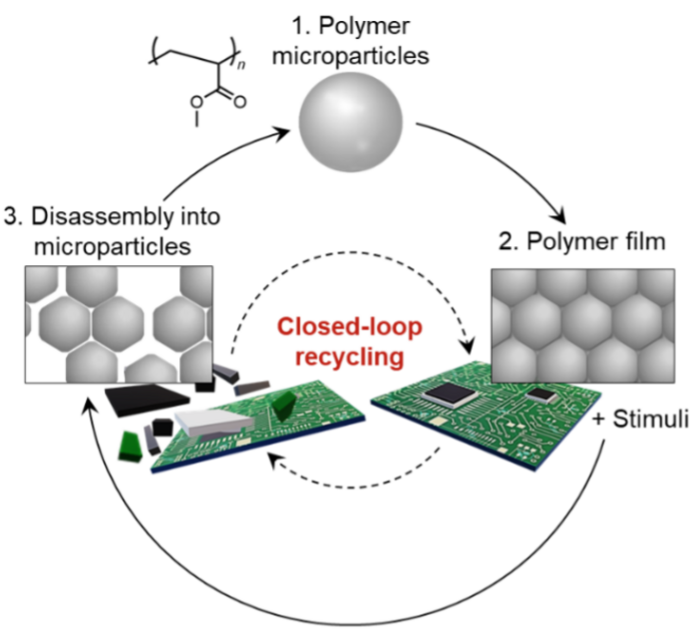The ever-increasing generation of plastic solid waste has resulted in global plastic pollution both on land and in the oceans. Projections show that plastic waste will double in the next 20 years, causing further environmental problems. Large amounts of plastic waste are, at present, incinerated or deposited in landfills. This not only degrades the environment but also depletes valuable resources.

Credit: Daisuke Suzuki from Shinshu University
The ever-increasing generation of plastic solid waste has resulted in global plastic pollution both on land and in the oceans. Projections show that plastic waste will double in the next 20 years, causing further environmental problems. Large amounts of plastic waste are, at present, incinerated or deposited in landfills. This not only degrades the environment but also depletes valuable resources.
In this light, recycling plastics such as polymers is a promising sustainable alternative for waste management. But this involves the breaking of chemical bonds between monomers (building blocks of polymers), which diminishes their overall stability and quality. Addressing this concern, researchers have developed methods to recycle polymers in a “closed loop”, that is, without the loss of these properties. However, these methods are complicated and expensive and require specialized monomers, necessitating further innovation.
In this direction, a group of researchers led by Daisuke Suzuki, an Associate Professor at Shinshu University, has recently proposed a closed-loop recycling process based on polymer microparticles. Their work, co-authored by Dr. Takumi Watanabe and Dr. Haruka Minato of Shinshu University, has been published in the journal Green Chemistry.
Prof. Suzuki briefly explains the rationale behind their strategy: “Recycling materials without deterioration (closed-loop recycling) is attractive in terms of reducing anthropogenic waste. However, this currently remains very difficult given that there usually is a trade-off between mechanical stability and degradability of polymer materials. Our material recycling concept with microparticles enables the recycling of a huge amount of functional polymer materials that we use in our day-to-day lives and has the potential to solve the problems of resource depletion and environmental pollution.”
In their study, the authors prepared polymer microparticles via the aqueous emulsion polymerization of methyl acrylate (MA) monomers in water, which resulted in polymer chains. These aggregated to form a solution containing uniform spherical poly-MA microparticles. The solution was then dried to get a thin polymer film with physical (as opposed to chemical) cross-linking among the microparticles, which could be reobtained by dissolving the film in ethanol. These recycled microparticles, in turn, could be reused to form various recycled materials.
The films synthesized in this work exhibit several desirable properties, which they retain upon recycling. They have high mechanical stability and fracture energy, which is an indicator of their toughness. The latter property increases with the interfacial thickness between the poly-MA microparticles. This, in turn, decreases with the degree of interparticle cross-linking but increases upon heating the film.
The researchers further enhanced the fracture energy of the polymer films by mixing the microparticles with silica nanofillers. Moreover, adding colored pigments gave the resulting composite films tunable optical properties, which did not diminish upon recycling. These results suggest that closed-loop recycling based on polymer microparticles will enable resource circulation for polymers as well as numerous other composite materials that contain polymer microparticles to create adhering interfaces between their different layers.
Concludingly, Prof. Suzuki highlights the future potential of the present work. “Our concept can lead to the production of fully recyclable films with high fracture energy. Therefore, it will enable the recycling of huge amounts of various polymer materials, thus reducing plastic waste and potentially solving the problems of environmental degradation and plastic pollution.”
The “closed”-loop recycling strategy certainly “opens” new doors for the efficient and sustainable recycling of polymer materials!
###
About Shinshu University:
Founded in 1949, Shinshu University is a national university nestled under the Japanese Alps in Nagano, known for its stunning natural landscapes. Our motto, Powered by Nature – strengthening our network with society and applying nature to create innovative solutions for a better tomorrow, reflects the mission of fostering promising creative professionals and deepening the collaborative relationship with local communities, which leads up to our contribution to regional development through innovation in various fields. We are working on providing solutions for building sustainable society through interdisciplinary research fields: materials science (carbon, fiber, and composites), biomedical science (for intractable diseases and preventive medicine), and mountain science, and aiming to boost research and innovation capability through collaborative projects with distinguished researchers from across the world. For more information, visit https://www.shinshu-u.ac.jp/english/ and follow us on Twitter @ShinshuUni for our latest news.
Journal
Green Chemistry
DOI
10.1039/D3GC00090G
Method of Research
Experimental study
Subject of Research
Not applicable
Article Title
Closed-loop recycling of microparticle-based polymers
Article Publication Date
21-Mar-2023
COI Statement
No competing interests to declare.




